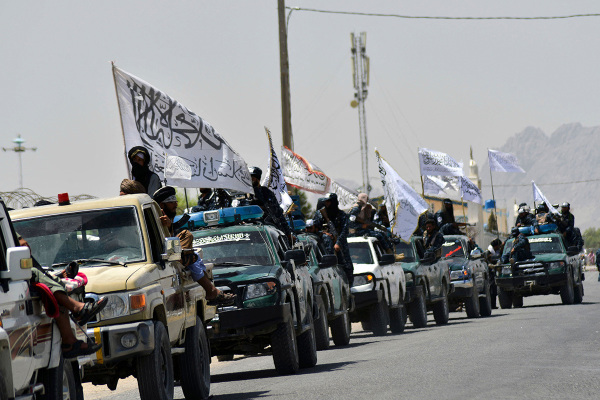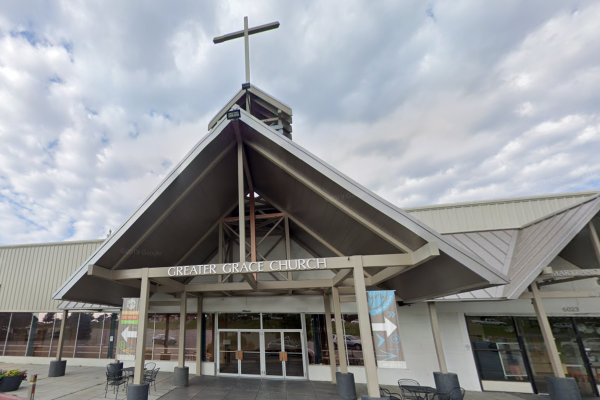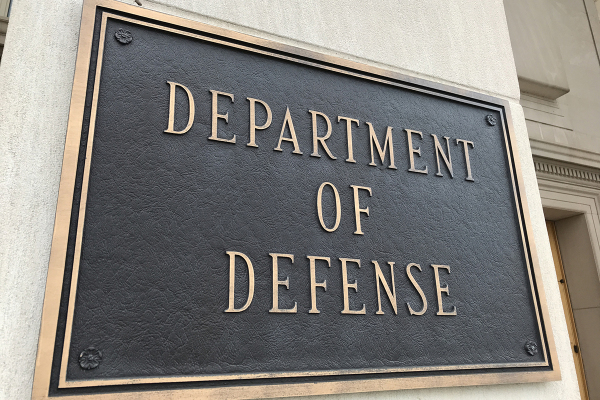Anglicans, Episcopalians still weighing General Convention
One month after the Episcopal Church's General Convention adjourned on August 8 in Minneapolis, reactions to several of its decisions on sexuality issues continue to ripple through the church and across the Internet. Bishops and deputies have been meeting with parishes in an effort to explain the convention's decision to accept the election of the Rev. Gene Robinson as the bishop of the Diocese of New Hampshire. Robinson has been in a committed relationship with another man for 13 years. Although the convention backed away from resolutions calling for preparation of a liturgy for blessing same-gender relationships, it did recognize that such blessings are taking place in some dioceses and that "local faith communities are operating within the bounds of our common life" when they do so. The convention asked Presiding Bishop Frank T. Griswold to appoint a commission to facilitate "as wide a conversation of discernment as possible" on the issue of same-gender blessings.
Some of the primates of the worldwide Anglican Communion had previously warned the Episcopal Church and General Convention that there would be a "dramatic realignment" in response. At a meeting in Fairfax, Virginia, prior to the convention, participants predicted that parishes would attempt to break away from dioceses, refuse to recognize the authority of their bishops, and withhold funds in protest. That has been happening in some parts of the church, although it is not yet clear how widespread such actions are.
Anglicans at crossroads?
"We have come to what I might describe as a crossroads and these events are going to determine the future and fate of our Communion," predicted Archbishop Peter Akinola of Nigeria at a press conference following the Fairfax meeting.
Following the vote on Robinson's election, Bishop Mouneer Anis of Egypt released a statement saying that the decision "showed great disrespect to the majority of the members of the Anglican Communion and the church worldwide" and could damage interfaith relations. Archbishop Bernard Malango, primate of the Province of Central Africa, declared that the decision "has shattered the Anglican Communion. Deep pain has been inflicted upon us all. We are now experiencing an overwhelming sense of loss of direction of the Anglican Communion."
In a September 2 statement, Archbishop Livingstone Mpalanyi Nkoyoyo of the Church of Uganda opined that the decision meant the American church was "separating themselves from the Anglican Communion family...leading your people astray into satanic ways." "We condemn this decision as bishops and on your behalf, Ugandans," Nkoyoyo wrote, "and we further state that we shall make sure that it never will happen in the life of the Church of Uganda and never condone it anywhere in Christendom."
But Archbishop Winston Ndungane, primate of the church in Southern Africa, called for restraint and understanding. "Adopting a hard-line stance does nothing to enhance church unity, he said. "Dialogue, sharing stories and experiences are the ways to understanding the complexities of our humanity."
In an August 19 letter addressed to his fellow primates, Griswold said, "My own sense is that one of our Anglican gifts is to contain different theological perspectives within a context of common prayer." He said that his ministry now is one of "helping our church to find a way forward that both preserves the unity of the church and honors the deeply held divergent points of view among us." He added that "it is my firm conviction that in the open space of God's mercy the present moment may yield a blessing."
Special meeting of primates
Archbishop of Canterbury Rowan Williams called a meeting of the primates in London October 15-16 to discuss the consequences of the convention actions. "I hope that in our deliberations we will find that there are ways forward in this situation which can preserve our respect for one another and for the bonds that unite us." Some of the African church leaders said that they will hold their own meeting prior to the one in London.
The American Anglican Council has also called for a special October 7-9 meeting of "faithful orthodox members of the Episcopal Church" One of the announced goals is "to prepare our congregations and ministries for possible realignment to insure an orthodox and vital Anglican/Episcopal presence in the United States."
A number of conservative dioceses have also called special meetings.
Bishop Robert Duncan of Pittsburgh said that the special convention September 27 will be asked "to reject the unbiblical, anti-ecumenical and unconstitutional actions of the recent General Convention" and "begin to build a protected place for our witness." The diocese is holding open hearings in parishes prior to the convention.
A special September 27 convention of the Diocese of Ft. Worth will consider similar resolutions to "repudiate and disassociate" from the convention decisions and "reaffirm" the practice to allow congregations to determine what percentage of diocesan funds would be sent to support the program of the national church. In a pastoral letter, Bishop Jack Kier said, "These decisions have wounded the Body of Christ and left us more divided and broken than ever before." In an August 18 meeting with clergy, Bishop Edward Salmon of South Carolina said that "the ball game has changed. And it's on an international level now rather than a local fight among dioceses, between liberals and conservatives." He added, "The issue is what's the church in the United States, who's in communion with the archbishop of Canterbury? We as a church and as a Communion are in a deadly serious situation."
A pastoral letter by Bishop John Howe in Central Florida said that the convention decisions "plunge us into a constitutional crisis" because they no longer uphold the historic faith and order expressed in the Preamble to the church's Constitution. He called a special convention for September 20 to "consider together what all of this means to us." Other bishops, on both sides of the issues, addressed the situation in more moderate tones. In the Diocese of Virginia, for example, Bishop Peter James Lee announced a series of meetings around the diocese "to weigh the effects of the convention on our congregations and our diocese." He urged church members to "give thanks for our tolerant expression of difference and for the love of Christ that bridges all gaps and holds us together." Lee and the deputies voted for confirmation of Robinson's election.
In meetings with clergy and church members in the diocese of Western Louisiana, Bishop Bruce McPherson warned against overreacting to the convention decisions, encouraging them not to get so lost in the controversy that they lose sight of their mission as Christians. "Don't give up because that's when the devil has us doomed. MacPherson, who voted against confirmation of Robinson's election, said at a meeting at St. Mark's Cathedral in Shreveport attended by more than 300 people, "We are a people of faith. We are seeking to know God's will."
Bishop James Stanton of Dallas said that the Episcopal Church "is a welcoming church" where the "apostolic teaching is the foundation of our common life." By its actions the Episcopal Church "has not been true to its calling to 'uphold and propagate the historic Faith and Order' of the Christian Church," instead provoking a crisis. "The General Convention has erred. We will wait patiently and expectantly for the rest of the Communion of which we are a part to render judgment on what we have done."
Holding together
"There are people who are predicting that these decisions will cause irreparable division in the Episcopal Church," said Bishop Neil Alexander in a pastoral letter to the Diocese of Atlanta. "I do not believe that because what I know, that most of the media does not, is how much Episcopalians love their church. We are a church that was born in conflict and we have stayed together when nearly all of our sister churches have split apart. It is of the nature of our Anglican heritage to hold together...."
In describing the dynamics of the debate in the House of Bishops, Bishop Clifton Daniel II of East Carolina said that "the conversation was respectful, calm, impassioned at times, prayerful and considerate. At the end of the day, with the results of the voting announced, the divisions were still there, as was some pain. But there was a spirit in the House of Bishops that while we were not all of one mind, we are of one heart in our devotion to our Lord, his church, and the mission of reconciliation entrusted to us." He concluded, "As Episcopalians and as part of the Anglican Communion, we are well-equipped by our heritage and traditions to face openly and honestly into the controversies each new generation brings."
A similar note was sounded by Bishop Larry Maze of Arkansas, who said, "The Episcopal Church has a rich history of being willing to enter difficult conversations in order to bring our own insights to the table... Some have said that General Convention was simply being politically correct in its actions. Those who prayed and deliberated and listened to one another at convention know otherwise. This is a long conversation and by joining it with honesty and integrity we find ourselves in disagreement. We're learning much by listening and, I pray, we're offering much by letting our voices be heard."
A separate province?
Some of those voices are renewing long-standing calls for a separate, non-geographic jurisdiction, one that is recognized by the archbishop of Canterbury and therefore a member of the Anglican Communion, to "protect" traditionalists. That possibility seems to have received a boost from the archbishop himself. The British press has called attention to an article by Rowan Williams in the magazine New Directions, published by Forward in Faith UK, an organization opposed to the ordination of women. In it, Williams stated that the primates have said that "unity becomes finally unintelligible and unworthwhile when it itself ceases to be a theological category. Staying together is pointless unless it is staying together because of the Body of Christ." He concluded that it is "worth working at structures in Anglicanism that don't either commit us to a meaningless structural uniformity or leave us in mutual isolation."
In the article, written before the American convention, Williams said, "I suspect that those who speak of new alignments and new patterns, of the weakening of territorial jurisdiction and the like, are seeing the situation pretty accurately....I don't expect the next few years to be anything other than messy as far as all this is concerned. The question is not whether we can avoid mess but whether we can hang on to common convictions about divine grace and initiative."
Some primates have already stated that they will go to the London meeting with the goal of seeking to discipline the Episcopal Church, calling on it to repudiate its decisions-or else. Archbishop Drexel Gomez, primate of the West Indies, said that the American church could "choose whether it wishes to remain with us or not." According to the London Telegraph, Drexel said that he would be "very disappointed" if the primates didn't join efforts for a "showdown" over sexuality issues that could foster efforts to expel the Episcopal Church USA or reduce its status in the Anglican Communion.
Wholeness not fractions
Confessing some confusion over the call to establish a new "orthodox" province, Gary Kriss, former dean of Nashotah House, said in an article in The Living Church that "what they really seem to want is for a substantial portion of the Episcopal Church to be booted out of the Anglican Communion but apparently they will settle for a separate but equal province."
Faced with the prospect of division, "one has to wonder whether the proposed solution makes any kind of sense, even under the rubric of Anglican ambiguity: two provinces within the same geographical boundaries, both claiming to be 'the real thing,' both in communion with the same international fellowship but not in communion with one another," Kriss said.
Describing himself "as one who has stood firmly on the Anglo-Catholic side on these issues," Kriss concluded that "a new province does not seem like an honest or viable solution" because it would be "an alliance of opposites which would inevitably fracture, sooner or later. Christ's one, holy, catholic and apostolic church is about wholeness, not fractions."






















